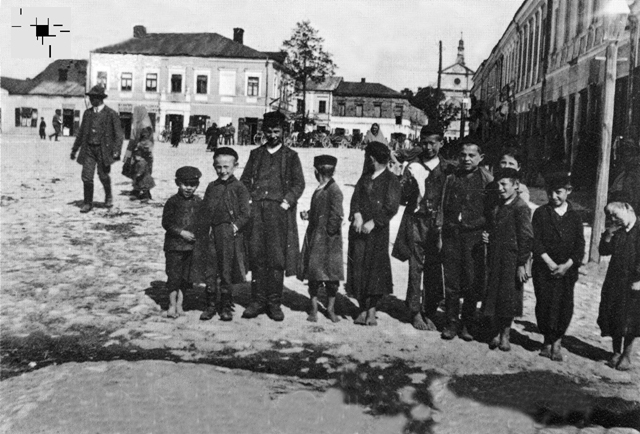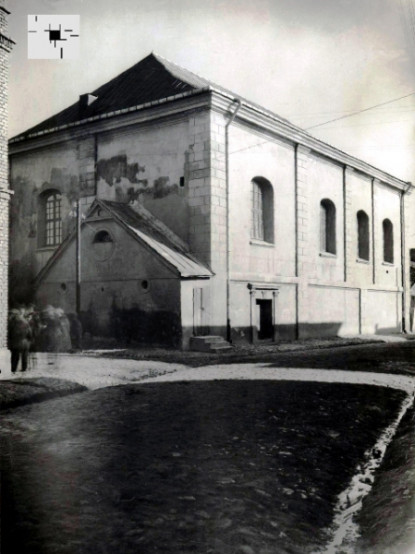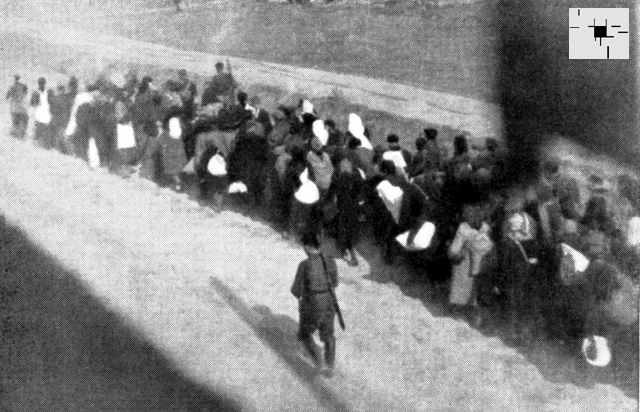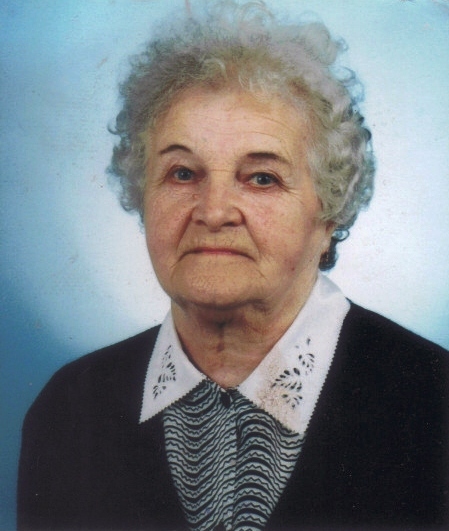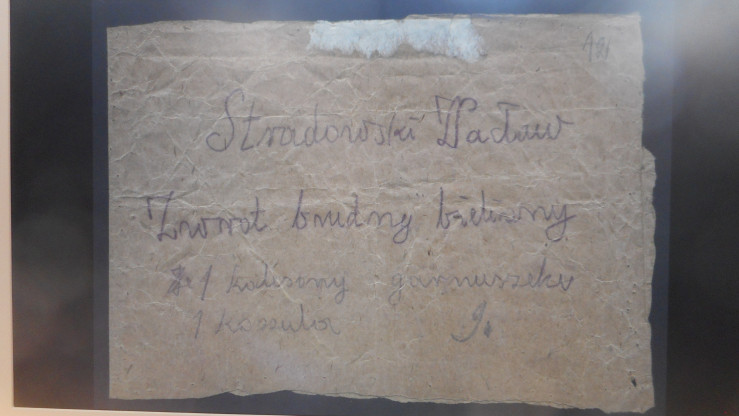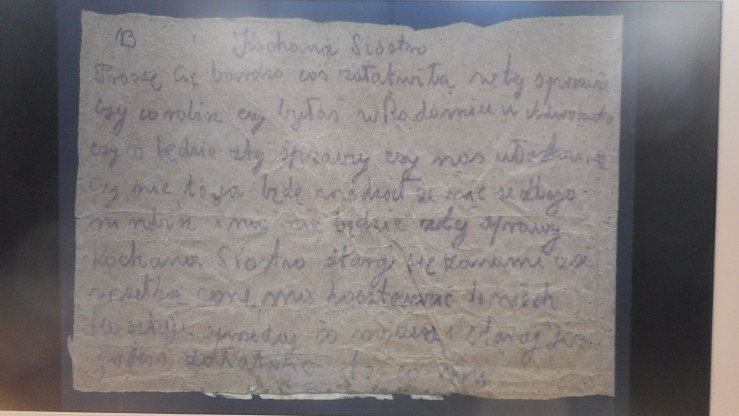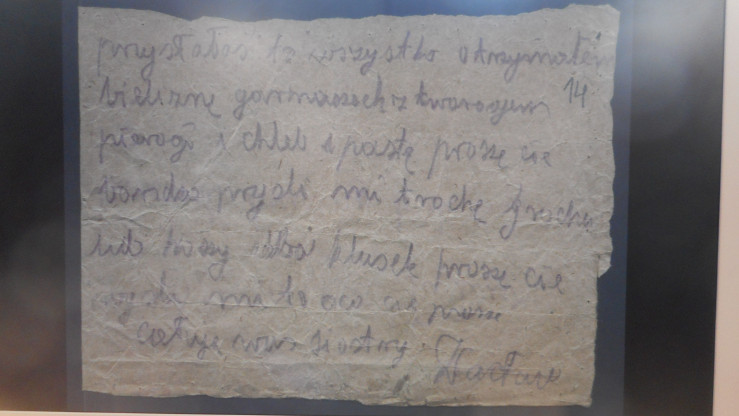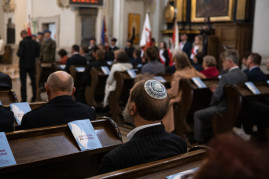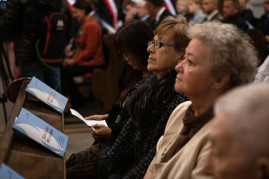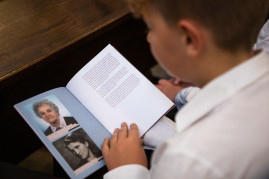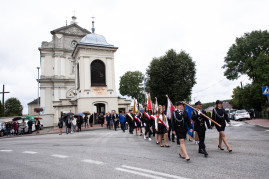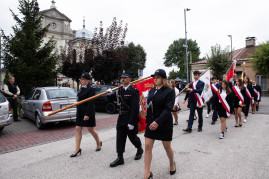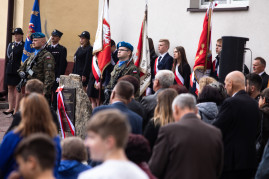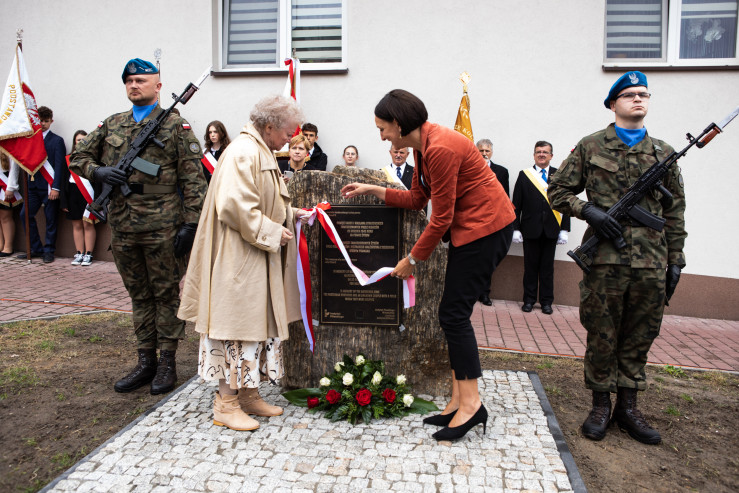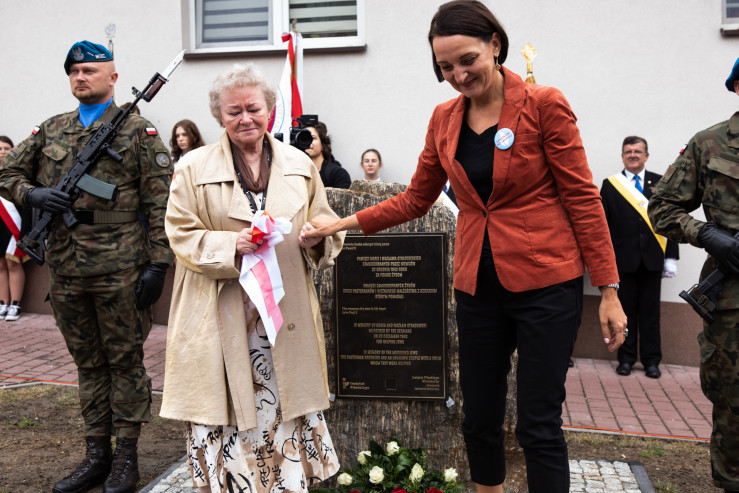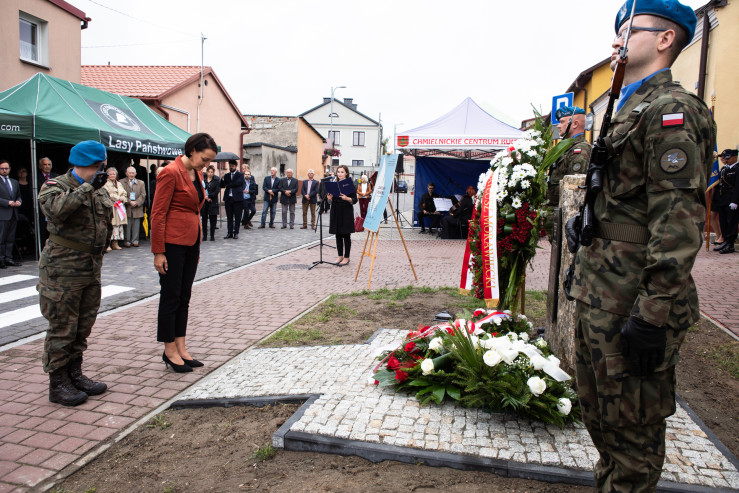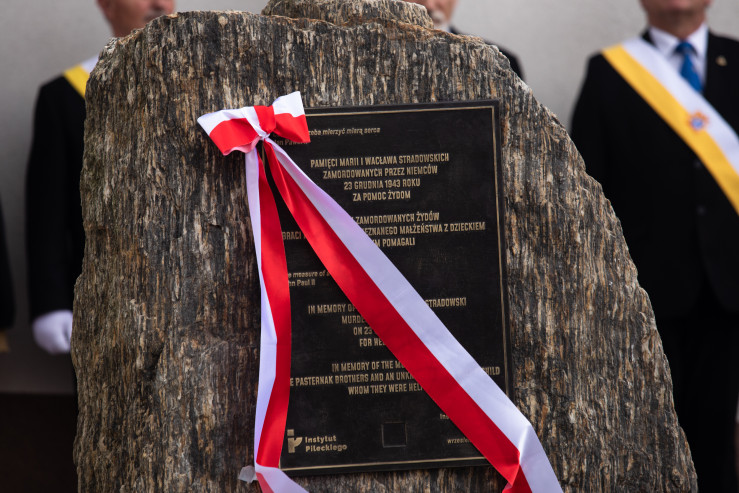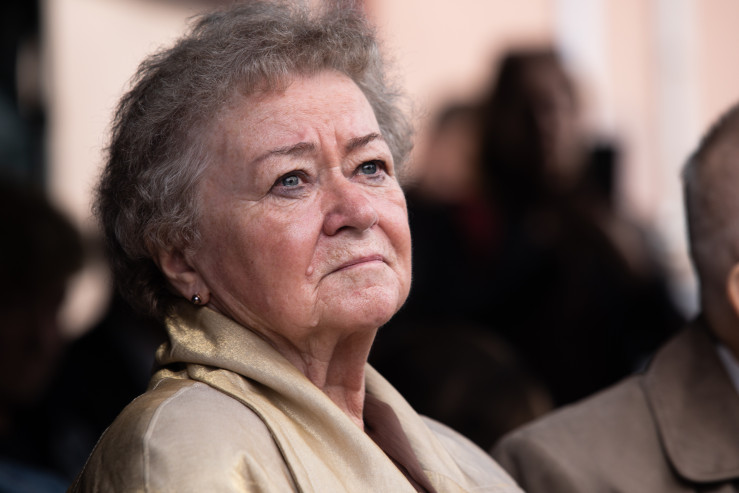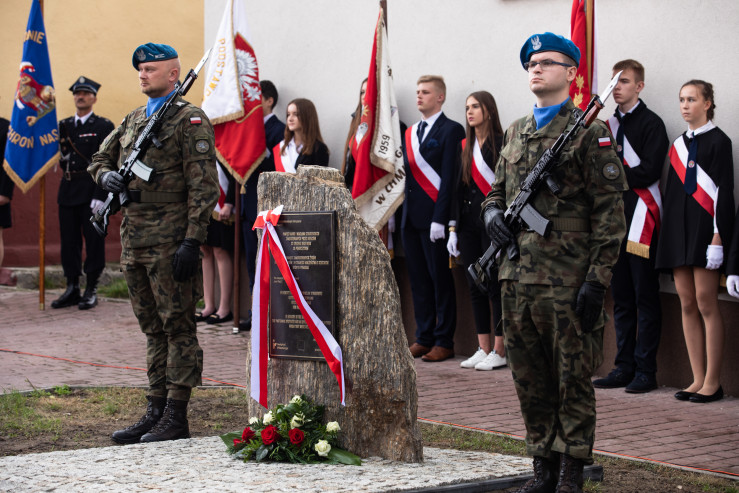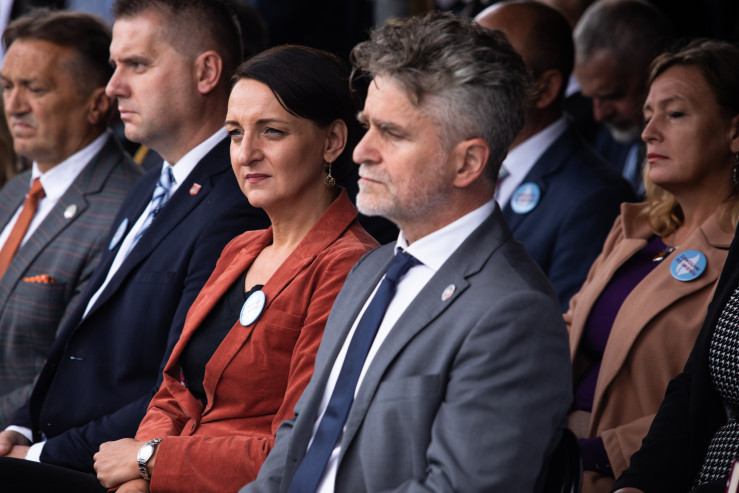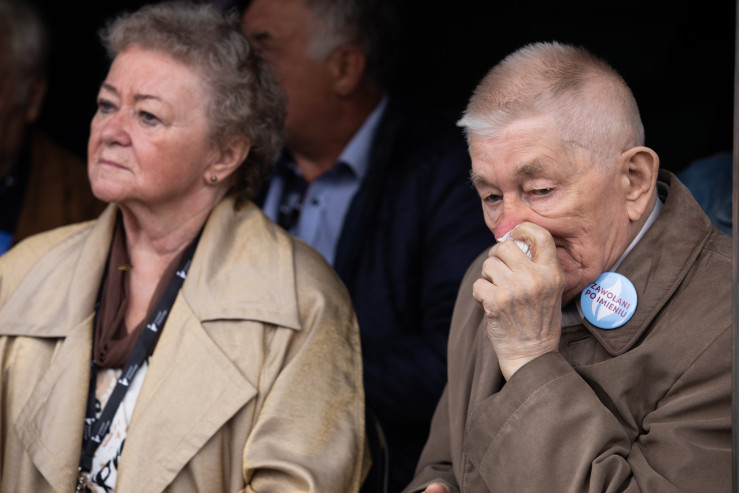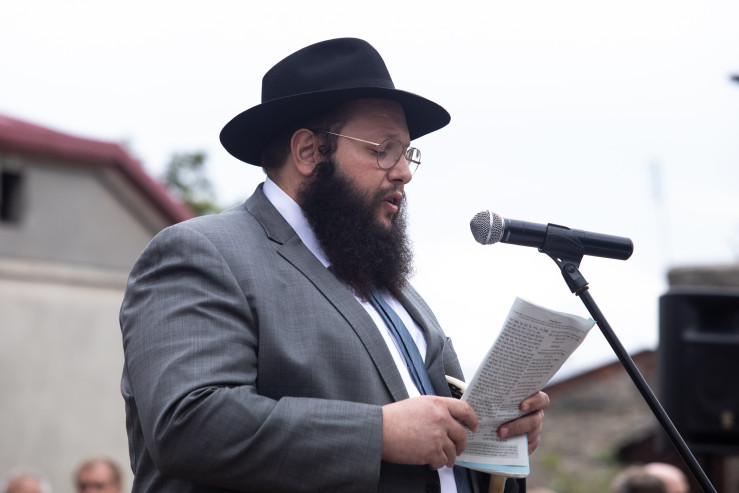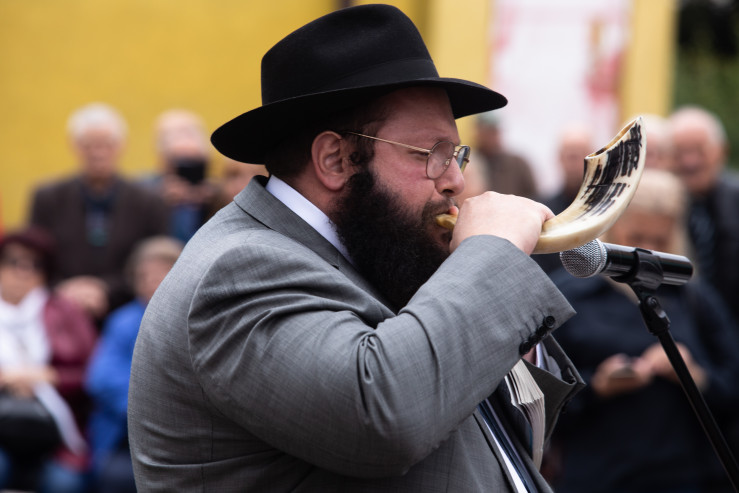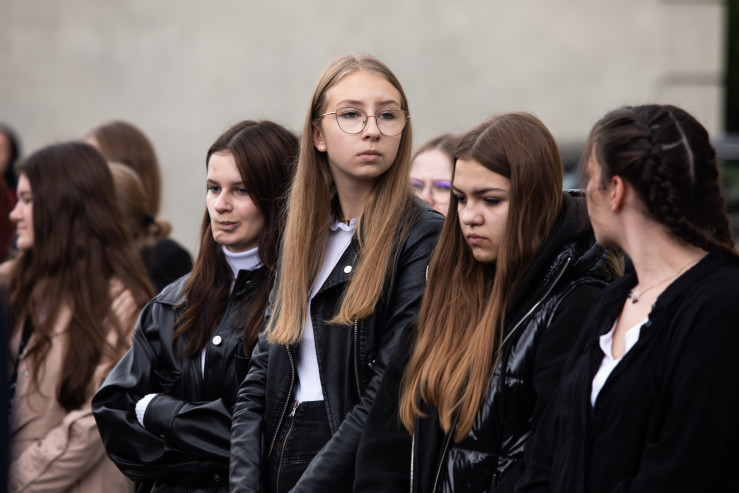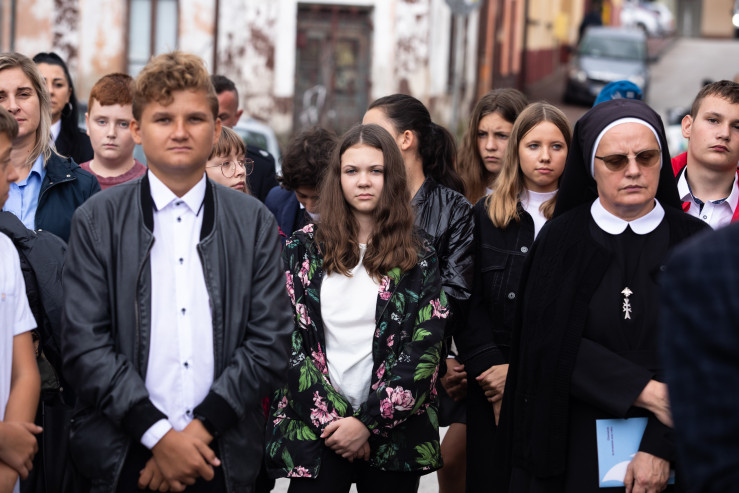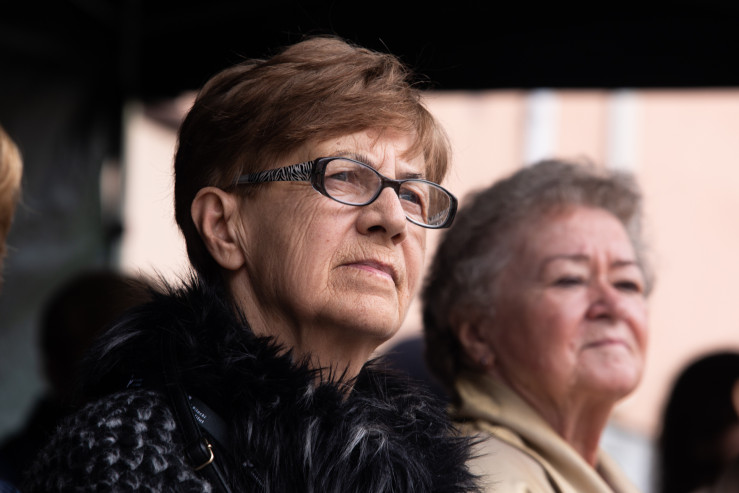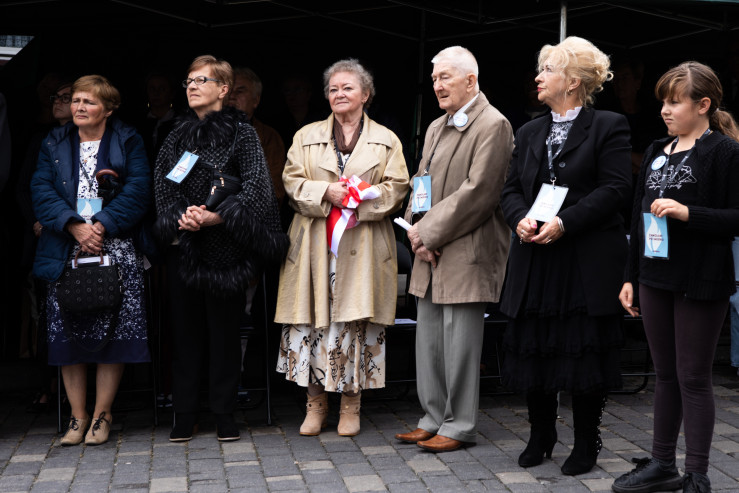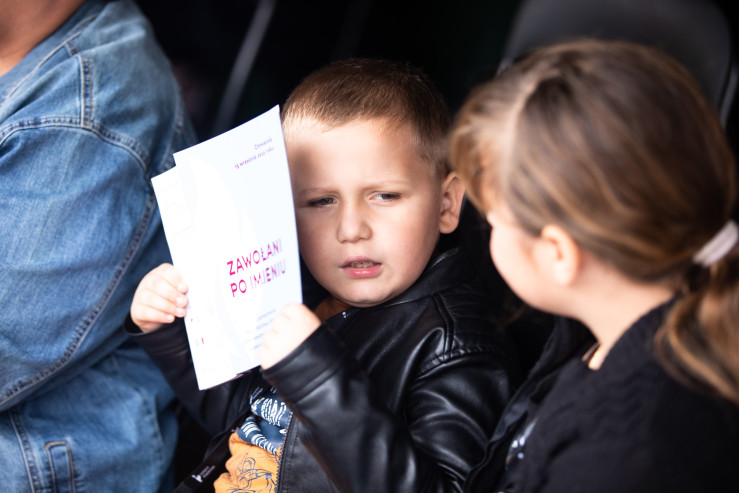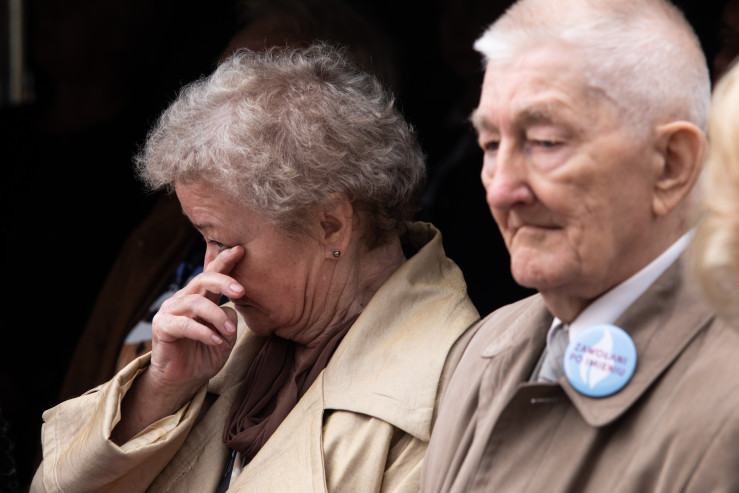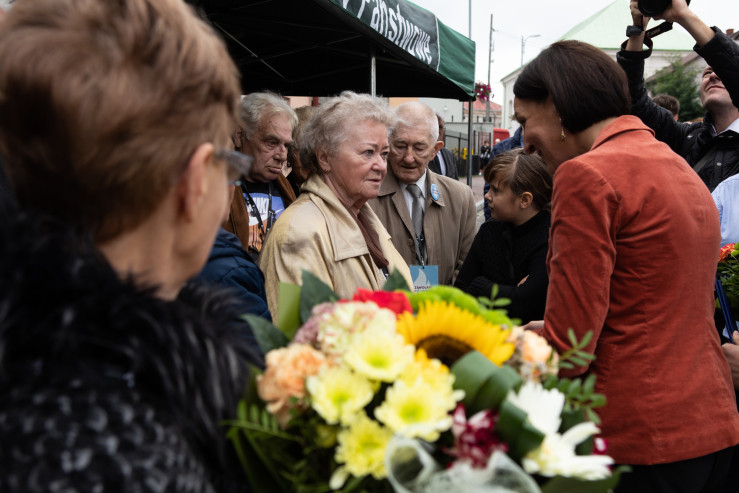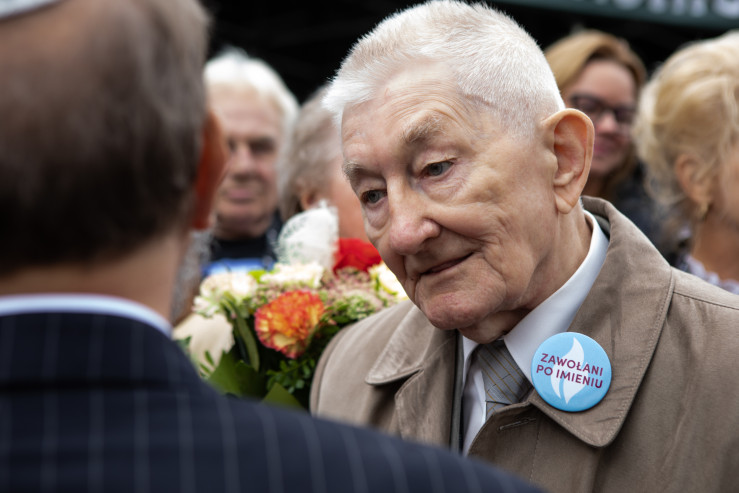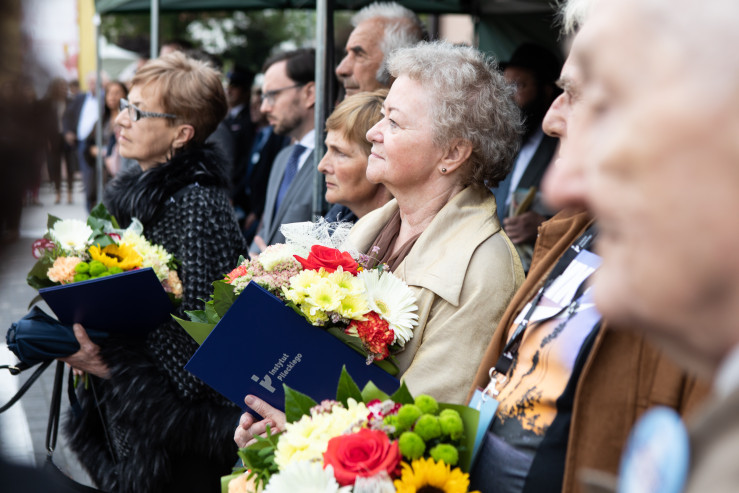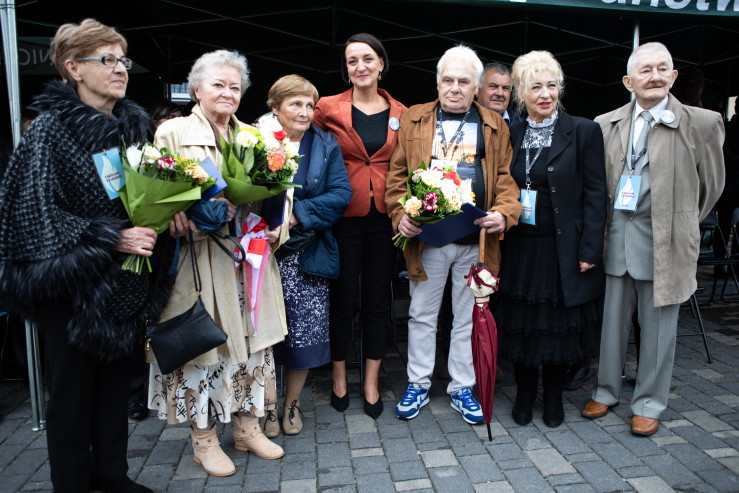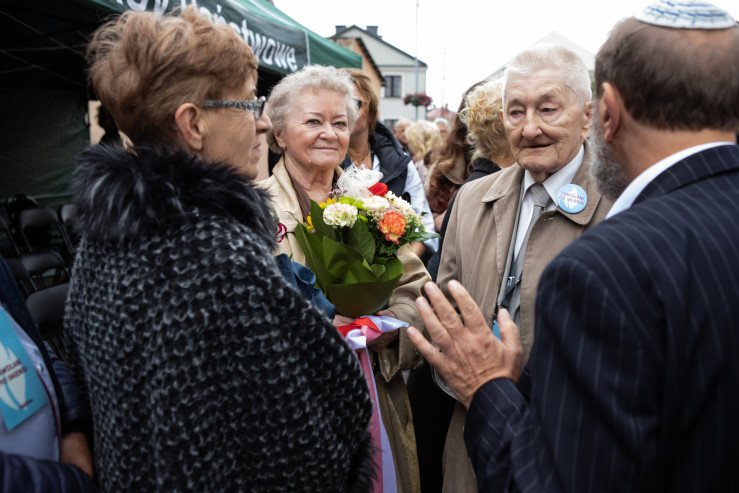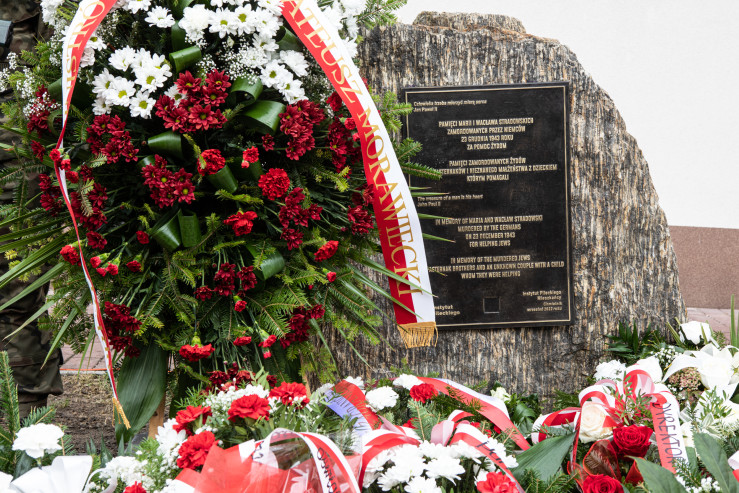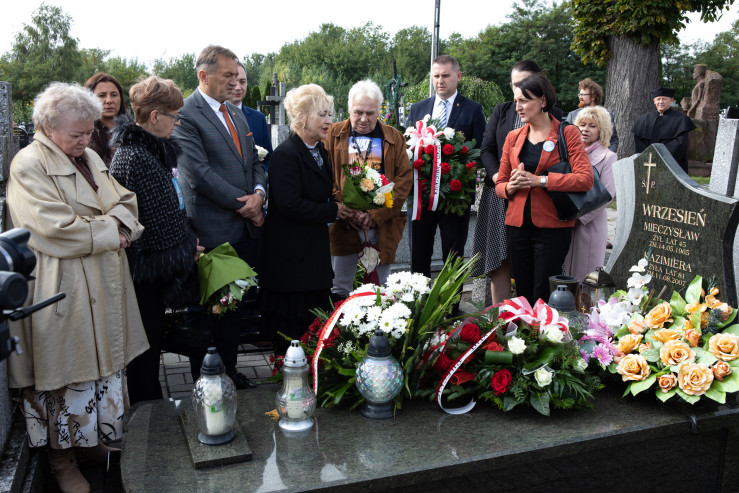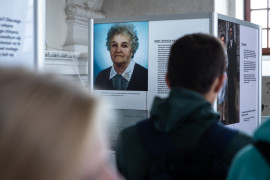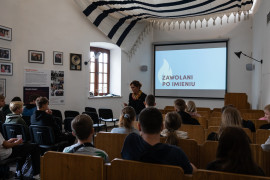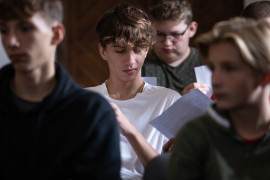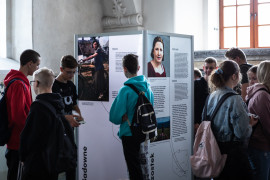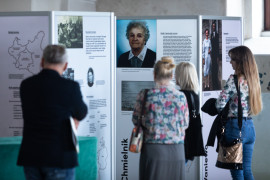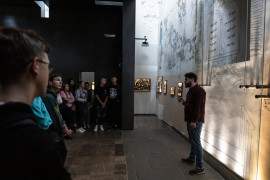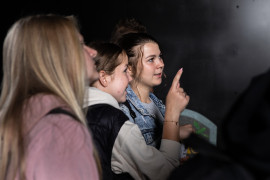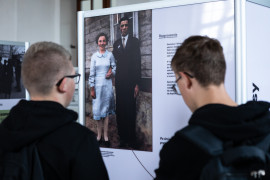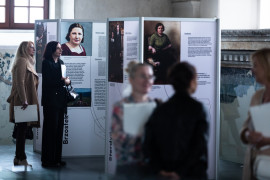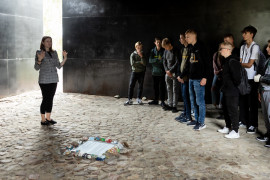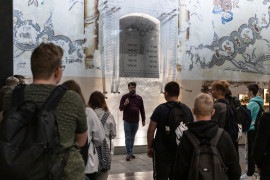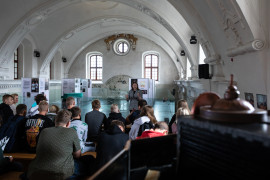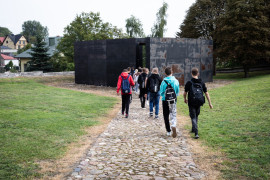The commemoration of Marianna and Wacław Stradowski, who were murdered for helping Jews | CALLED BY NAME - Instytut Pileckiego
The commemoration of Marianna and Wacław Stradowski, who were murdered for helping Jews | CALLED BY NAME
On 15 September 2022 in Chmielnik (Świętokrzyskie Voivodeship), the Pilecki Institute commemorated Marianna Stradowska and her son Wacław, who were sentenced to death by the Germans for helping five Jews. It was the 28th commemoration, as part of which two more people – heroes who risked and, ultimately, sacrificed their lives to rescue others – were “called by name”.
I wasn’t told directly that they were executed by shooting, but I think it must have been the case. To this day I don’t know where exactly and when my mother and brother were killed.
Interrogation of witness Matylda Habik (née Stradowska, daughter of Maria Stradowska, sister of Wacaław Stradowski), 21 September 1944, Archives of the Institute of National Remembrance, file ref. no. 392/1191.
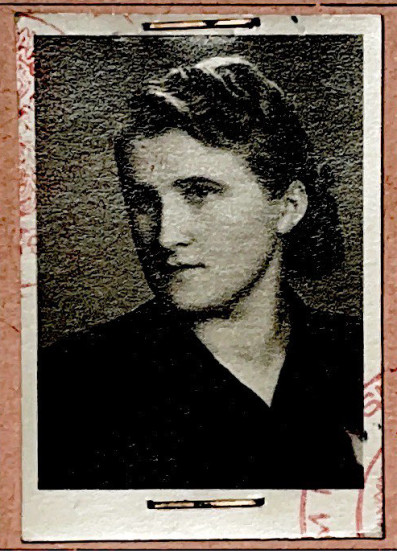
Matylda Habik née Stradowska, daughter of Maria Stradowska, sister of Wacław Stradowski. Photograph from the collections of the Habik family.
On 15 September 2022 in Chmielnik, the Pilecki Institute commemorated Marianna and Wacław Stradowski, who were murdered by the Germans for hiding five Jews: the brothers Pasternak and a married couple with a 10-year-old child. With the 28th commemorative stone, we inscribed into social memory another two names of people who risked their own lives to save the lives of others. So far, 64 people have been “called by name”, including the heroes from Chmielnik. The program has received the Honorary National Patronage of the President of the Republic of Poland Andrzej Duda to mark the Centenary of Regaining Independence.
The story of Maria Stradowska and her son Wacław
Maria (Marianna) Stradowska née Piotrowska (born 1900) and her three children: Wacław (born 1921), Matylda (born 1924) and Kazimiera (born 1926) lived in a house on Szydłowska Street in Chmielnik. Marianna was widowed in 1926; she became the family’s sole provider and earned a living by running a farm. The Jewish community had been living in Chmielnik for centuries – in the interwar period, they accounted for about 80% of town residents. The German assault on Poland in 1939 put an end to the Jewish presence in Chmielnik. In the first half of 1941, the Germans established a ghetto not only for local Jews, but also for those from other towns of occupied Poland. A dozen months later, a liquidation of the ghetto began; it was concluded in December of the same year. The Jews were brought to the so-called cattle market, which was situated two kilometers away from the town. The Germans murdered about 500 Jews at the site, and the rest were deported mostly to Treblinka.
As the researcher of the Stradowski case, Dr. Wojciech Cedro from the Pilecki Institute, says: When the liquidation of the Chmielnik ghetto began, a group of Jews – two Pasternak brothers and an unknown couple with an approx. 10-year-old child – came to the Stradowski family to ask for help. Maria and her teenage children gave them shelter in their own house, placing the Jews in a room where they had previously kept farming equipment. On the late evening of 31 January 1943, probably following a denunciation, German gendarmes (including among others Julian Świątek and Bernhard Krause) arrived at the Stradowski household – continues Dr. Cedro. One of the Chmielnik residents showed them the way. The gendarmes found the hiding place at the house and bestially murdered the five Jews. The bodies of the victims were buried at the Jewish cemetery in Chmielnik.
Maria and her three children managed to escape. The family returned home when the gendarmes had left, only Wacław – fearing for his safety – decided to remain in hiding. Their house was probably under surveillance, because when Stradowski came home a few days later, he and his mother were immediately arrested by the gendarmes. On 11 February 1943, both of them were transported to the German Penal Institution in Pińczów, where they were charged with sheltering Jews. From there they were sent to a prison in Kielce, where on 25 March they were tried before a special court. Maria and Wacław Stradowski were sentenced to death.
The 19-year-old Matylda and her two years younger sister, Kazimiera, were left alone at the farm. They regularly went to see their mother and brother, as well as sent them food parcels and letters. They also sent a plea for clemency to Hans Frank, but the death sentence was upheld. The Germans murdered Maria and Wacław Stradowski on 23 December 1943, a day before Christmas Eve. Matylda and Kazimiera weren’t notified that the sentence had been carried out; they only received a parcel with their mother and brother’s belongings. In 1947, Stefan Pawłowski stood trial for cooperation with the German occupier. He was acquitted. Julian Świątek, one of the German gendarmes, was initially sentenced to death, but in 1950 his sentence was commuted to 15 years in prison, and in 1956 – to 10. The other gendarme, Bernhard Krause, was never brought to justice.
My sister and I were notified in writing about the sentence. We appealed against this sentence to the General Governor Hans Frank, who was residing in Kraków. Our request was denied. We regularly went to see our mother and brother in the prison in Kielce. On 23 December 1943, I went to Kielce as usual to see them. In the prison I was told that my mother and brother were no longer there. I wasn’t told directly that they were executed by shooting, but I think it must have been the case. To this day I don’t know where exactly and when my mother and brother were killed. Interrogation of witness Matylda Habik (née Stradowska, daughter of Maria Stradowska, sister of Wacław Stradowski), 21 September 1944, Archives of the Institute of National Remembrance, file ref. no. 392/1191.
During the German occupation of 1939–1945, I lived in Chmielnik at Kielecka Street, where I also ran a smithy. I knew Maria Stradowska, née Piotrowska, and her son Wacław very well. They owned a horse and cart. I often shod his horse. I knew that he was helping Jews. He was transporting them in his cart and sheltering them in his house. I often warned him that this wouldn’t end well for him; I asked him whether he wasn’t afraid of what the Germans might do. But he would only wave his hand dismissively and wouldn’t say a word. Interrogation of Władysław Karyś, 18 March 1996, Archives of the Institute of National Remembrance, file ref. no. 392/1191.
COMMEMORATION, 15 September 2022
On 15 September 2022 the Pilecki Institute commemorated Maria and Wacław Stradowski, who were murdered for helping Jews. The ceremony took place in Chmielnik, in the Świętokrzyskie Voivodeship, and began with a mass at the Church of the Immaculate Conception of the Blessed Virgin Mary.
After the mass, the distinguished guests went in procession to the intersection of Wspólna Street with Lubańska Street, where a plaque commemorating Maria and Wacław Stradowski was unveiled.
The guests were welcomed by Prof. Magdalena Gawin, Director of the Pilecki Institute, initiator of the “Called by Name” program.
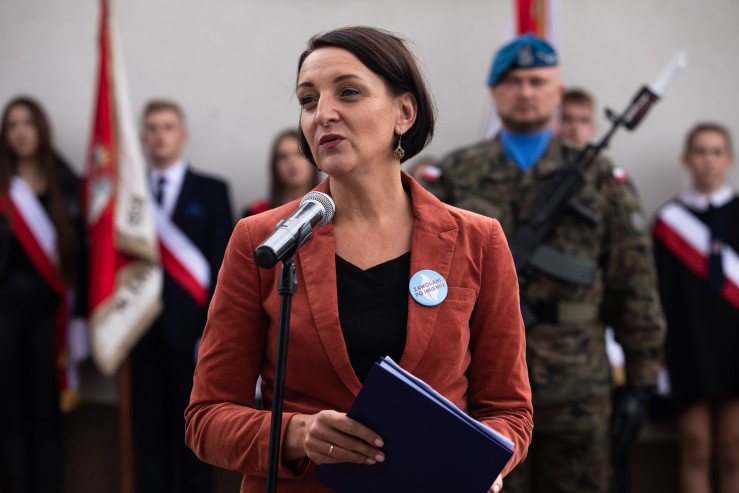
The relatives of Marianna and Wacław had very hard times for all those years. In the Polish People’s Republic, memory was neglected, and the experience of the Stradowski family was of the most marginalized kind.
For this reason, it is our common duty – as the local community, schools – to raise the youth in such a way that they will never forget. As Christians and Catholics, we are obliged to forgive, but this doesn’t mean amnesia.
Armed conflicts in Europe don’t belong to the past. The ongoing conflict in Ukraine shows that subsequent unnamed crimes for helping others may occur at any time. Western Europe never experienced death for helping others. This is why we have to remember and be confident about our experience to be able to pass it on to others, said Prof. Magdalena Gawin during the unveiling of the commemorative plaque.
Mrs. Krystyna Paradowska, granddaughter of Maria Stradowska and niece of Wacław Stradowski, spoke on behalf of the family of the “Called by Name”.
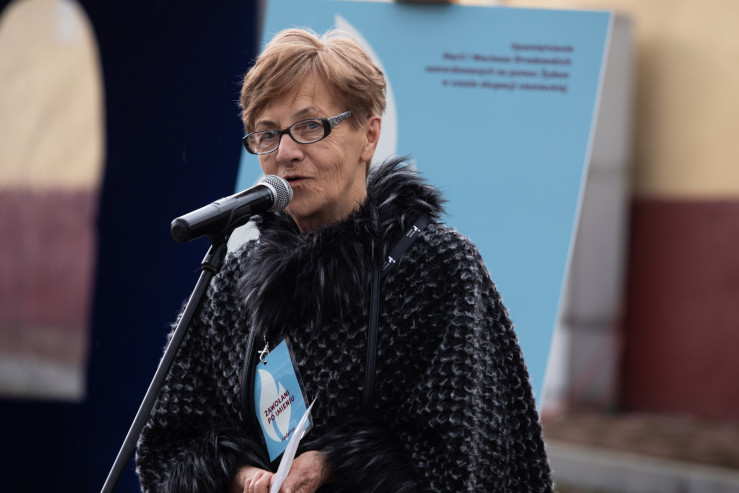
This story is very sad for me, because my grandmother and her son were shot for selfless help to others. Their burial place in unknown to this day. The surviving teenage daughters, Matylda and Kazimiera, were left without means of sustenance. They had very hard times: they suffered persecution, hunger, cold and pain. This story is all about great suffering and the deaths of innocent people – on both sides. It is also about the great sacrifice of the entire Stradowski family.
I would like to express sincere thanks for the plaque commemorating my grandmother and my uncle. I hope it will prevent us from forgetting about this tragedy and at the same time inspire reflection.
Next a letter was read out from Ambassador of Israel to the Republic of Poland Mr. Yacov Livne, who expressed his admiration for Maria and Wacław Stradowski for displaying bravery and fortitude at the moment of ordeal.
During the Holocaust, they consciously risked their lives and provided shelter to Jewish fugitives, who were persecuted by the Nazi regime simply because they were Jews. The Stradowskis showed true humanity – alas, they paid the utmost price for their actions.
Maria Stradowska and her son Wacław are Heroes deserving of our greatest respect. Their behavior should be a guiding light both for us and the future generations, while the memory about them should strengthen the ties between Poland and Israel, wrote his Excellency the Ambassador of Israel in Poland, Mr. Yacov Livne.
The plaque was unveiled by Prof. Magdalena Gawin, Director of the Pilecki Institute and initiator of the “Called by Name” program, and a representative of the Stradowski family – Mrs. Anna Borkowska-Balus, granddaughter of Maria and niece of Wacław. To conclude the ceremony, students from the Stefan Żeromski Elementary School in Chmielnik placed roses and – in accordance with the Jewish tradition – stones at the tombstone of Maria and Wacław Stradowski.
The ceremony in Chmielnik, like all the previous commemorations, was organized in close cooperation with the local government – the Kielce County and the Chmielnik Commune.
On 14 September 2022, students from primary and secondary schools in Chmielnik took part in special workshops, which were prepared in cooperation with the Education-Museum Center “Świętokrzyski Shtetl” in Chmielnik. The students learned about the fates of the “Called by Name” Marianna and Wacław Stradowski, as well as about the prewar history of their hometown and its Jewish residents. During the workshops, the participants explored the stories of help that was extended to the persecuted, discussed these choices and the obligations stemming from our memory about them.
On the same day, an educational session for educators and teachers from the schools in Chmielnik and the vicinity was held at the Education-Museum Center “Świętokrzyski Shtetl”. The session comprised a presentation of the “Called by Name” program, a workshop and a lecture on the fates of Marianna and Wacław Stradowski.
The “Called by Name” exhibition, which presents the stories of Poles murdered for helping Jews, including the heroes from Chmielnik, will be displayed at the Education-Museum Center “Świętokrzyski Shtetl” in Chmielnik until 4 October.
The “Called by Name” program is dedicated to Polish nationals who were murdered for helping Jews during the German occupation. The memory of those who showed heroism in the face of German terror is cherished in their families, yet these stories remain largely unknown to the general public. The program was created out of the need to mark the sites connected with the murdered victims in the public space. The Pilecki Institute strives to make these local experiences part of the universal historical awareness.
